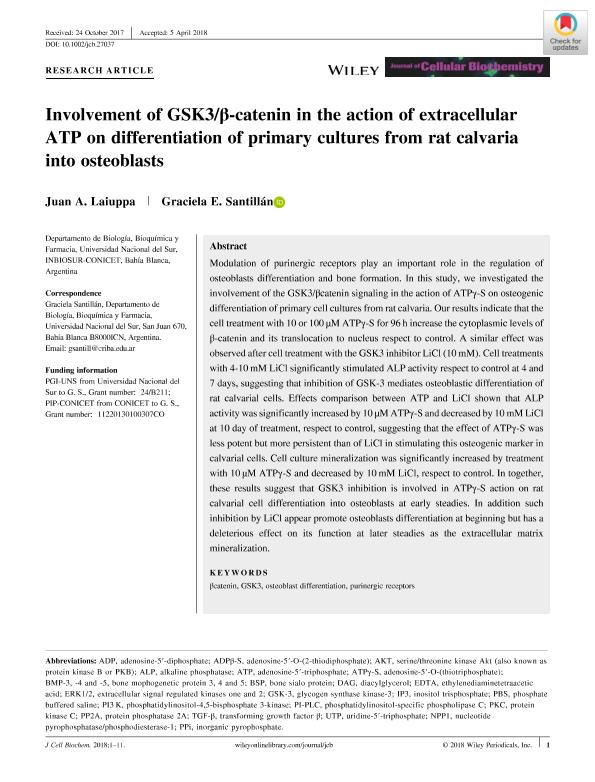Artículo
Involvement of GSK3/β-catenin in the action of extracellular ATP on differentiation of primary cultures from rat calvaria into osteoblasts
Fecha de publicación:
22/06/2018
Editorial:
Wiley-liss, div John Wiley & Sons Inc.
Revista:
Journal of Cellular Biochemistry
ISSN:
0730-2312
Idioma:
Inglés
Tipo de recurso:
Artículo publicado
Clasificación temática:
Resumen
Modulation of purinergic receptors play an important role in the regulation of osteoblasts differentiation and bone formation. In this study, we investigated the involvement of the GSK3/βcatenin signaling in the action of ATPγ-S on osteogenic differentiation of primary cell cultures from rat calvaria. Our results indicate that the cell treatment with 10 or 100 µM ATPγ-S for 96 h increase the cytoplasmic levels of β-catenin and its translocation to nucleus respect to control. A similar effect was observed after cell treatment with the GSK3 inhibitor LiCl (10 mM). Cell treatments with 4-10 mM LiCl significantly stimulated ALP activity respect to control at 4 and 7 days, suggesting that inhibition of GSK-3 mediates osteoblastic differentiation of rat calvarial cells. Effects comparison between ATP and LiCl shown that ALP activity was significantly increased by 10 µM ATPγ-S and decreased by 10 mM LiCl at 10 day of treatment, respect to control, suggesting that the effect of ATPγ-S was less potent but more persistent than of LiCl in stimulating this osteogenic marker in calvarial cells. Cell culture mineralization was significantly increased by treatment with 10 µM ATPγ-S and decreased by 10 mM LiCl, respect to control. In together, these results suggest that GSK3 inhibition is involved in ATPγ-S action on rat calvarial cell differentiation into osteoblasts at early steadies. In addition such inhibition by LiCl appear promote osteoblasts differentiation at beginning but has a deleterious effect on its function at later steadies as the extracellular matrix mineralization.
Palabras clave:
OSTEOBLASTS
,
PURINERGIC RECEPTORS
,
DIFFERENTIATION
,
GSK3/BETA-CATENIN
Archivos asociados
Licencia
Identificadores
Colecciones
Articulos(INBIOSUR)
Articulos de INSTITUTO DE CIENCIAS BIOLOGICAS Y BIOMEDICAS DEL SUR
Articulos de INSTITUTO DE CIENCIAS BIOLOGICAS Y BIOMEDICAS DEL SUR
Citación
Laiuppa, Juan Andrés; Santillán, Graciela Edith; Involvement of GSK3/β-catenin in the action of extracellular ATP on differentiation of primary cultures from rat calvaria into osteoblasts; Wiley-liss, div John Wiley & Sons Inc.; Journal of Cellular Biochemistry; 119; 10; 22-6-2018; 8378-8388
Compartir
Altmétricas




